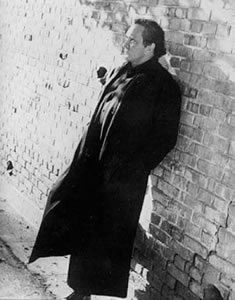
| Current Issue | Archives | Contact Us | Links | Discussion List |
 |
An Alternative Student Publication of the University of Oklahoma | ||||
|
| “Hello, I’m Johnny
Cash.” By: Bryce Sulaitis |
|
|
Recently, the world of music lost one of its last great living legends. Johnny Cash died in the early morning of Sept. 12th of complications from diabetes at Baptist Hospital in Nashville, Tennessee. Born in 1932 into a family of sharecroppers in Kingsland, Arkansas, he learned to sing while working the cotton fields with his family. He never forgot his working class roots and remained true to the American workingman and the plight of the county’s downtrodden for all of his life. Throughout his career he recorded over 1,500 songs that can be found on over 500 albums. He won 11 Grammy’s, hosted his own TV show, was inducted into both the Country Music Hall Of Fame and The Rock n Roll Hall of Fame, and at one point was outselling the Beatles. His influence was spread over many genres (rock, country, folk, gospel, etc.) each claiming him as their own, but he always remained true to himself even at the risk of losing it all. He was known as the “Man in Black” to many, and the reasoning behind this can be found in his song of the same name.
“Ah, I'd love to wear a rainbow every day, He was a defender of prisoners and blue-collar workers, of patriots and peaceniks. Anyone can hear a certain song of his and truly find something to relate to, something we’ve all felt at one time or another: loss, love, desperation, happiness, angst, hope, and longing. Regardless of what type of music you are into, give him a chance and his music will touch your heart, just as it has so many others. I have a very personal connection to his music because of memories of my Grandmother, who was a true fan of his; she would have us listen to 8-tracks of his whenever we would visit. I can’t tell you how many times I had heard “Folsom Prison Blues” or “I Walk the Line” before I could even comprehend what he was singing about. Losing him is like losing part of her once again. |
 |
| He has my respect and should have yours too; put on something black, hold up a lighter, have yourself a drink, put on his Folsom Prison album, go out and buy his final album American IV: The Man Comes Around, and watch a sunset and remember. | |
| ©2003 The Undercurrent | Current Issue • Archives • Contact Us • Links • Discussion List |